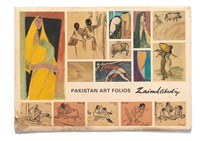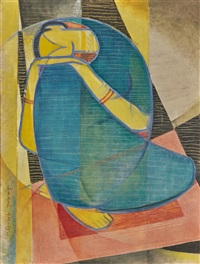Zainul Abedin
(Bangladeshi, 1914–1976)
Biography
Throughout his career, Abedin was known for his realistic and emotive depictions of everyday life in Bangladesh. He was a pioneer of the Bengal School of Art, which sought to portray the culture, traditions, and struggles of the Bengali people through art.
Abedin's work often focused on the lives of farmers, laborers, and minorities. He was inspired by the people he interacted with on a daily basis and was committed to social justice and public service.
His Famine Sketches depict the devastating effects of the 1943 Bengal famine. The series brought the plight of the starving millions to public attention, and is considered one of the greatest testimonies of human suffering in modern times.
After the partition of India, Abedin moved to East Pakistan (now Bangladesh) and continued to develop his art. His work became more abstract and expressive, yet still conveyed a sense of social concern. He was also an influential teacher and mentor to many young artists in Bangladesh.
Abedin died in 1976, leaving behind a powerful legacy of art and social activism. His paintings continue to sell for high prices at auction, with the highest sale price being $228,750 for Untitled (Santhal Women) (oil on canvas). His work is exhibited in major art galleries and museums around the world.

Zainul Abedin
Pakistan Art Folios: Zainul Abedin, 1943–1953
Sale Date: August 6, 2024
Auction Closed

Zainul Abedin
Pakistan Art Folios: Zainul Abedin, Karachi: , 1970
Sale Date: August 8, 2023
Auction Closed

Zainul Abedin
Pakistan Art Folios: Zainul Abedin, Karachi: , 1943
Sale Date: June 6, 2023
Auction Closed
;-untitled-(boat-race).jpg)
Zainul Abedin
Untitled (Bull); Untitled (Boat Race), 1966
Sale Date: September 23, 2020
Auction Closed
.jpg)



.jpg)

.jpg)
.jpg)
-(1943).jpg)

.jpg)
.jpg)



.jpg)


.jpg)
.jpg)
